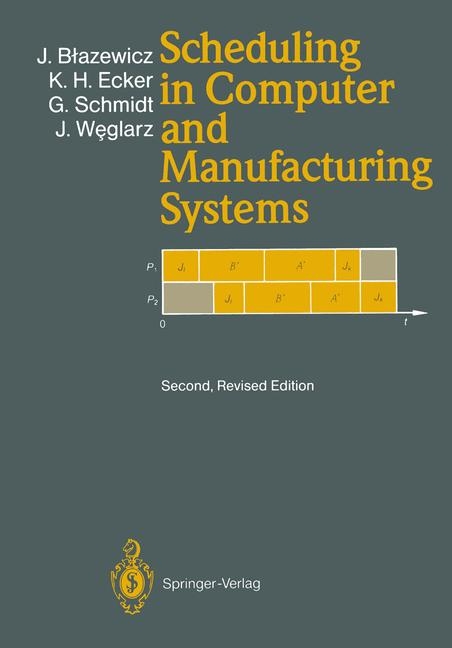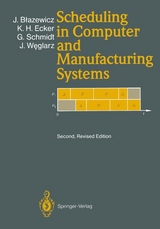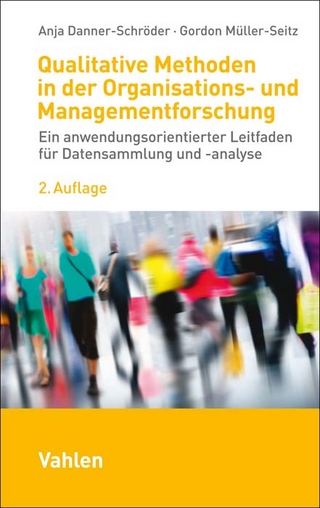Scheduling in Computer and Manufacturing Systems
Springer Berlin (Verlag)
978-3-540-58049-2 (ISBN)
- Titel ist leider vergriffen;
keine Neuauflage - Artikel merken
1 Introduction.- References.- 2 Preliminaries.- 2.1 Sets and Relations.- 2.2 Problems, Algorithms, Complexity.- 2.2.1 Problems and their Encoding.- 2.2.2 Algorithms.- 2.2.3 Complexity.- 2.3 Graphs and Networks.- 2.3.1 Basic Notions.- 2.3.2 Special Classes of Digraphs.- 2.3.3 Networks.- 2.4 Enumerative Methods.- 2.4.1 Dynamic Programming.- 2.4.2 Branch and Bound.- 2.5 Heuristic and Approximation Algorithms.- References.- 3 Formulation of Scheduling Problems.- 3.1 Definition of Scheduling Problems.- 3.2 Analysis of Scheduling Problems and Algorithms.- 3.3 Motivations for Deterministic Scheduling Problems.- 3.4 Classification of Deterministic Scheduling Problems.- References.- 4 Single Processor Scheduling.- 4.1 Minimizing Schedule Length.- 4.1.1 Scheduling with Release Times and Deadlines.- 4.1.2 Scheduling with Release Times and Delivery Times.- 4.2 Minimizing Mean Weighted Flow Time.- 4.3 Minimizing Due Date Involving Criteria.- 4.3.1 Maximum Lateness.- 4.3.2 Number of Tardy Tasks.- 4.3.3 Tardiness Problems.- 4.3.4 Earliness and Lateness Problems.- 4.4 Minimizing Change-Over Cost.- 4.4.1 Setup Scheduling.- 4.4.2 Lot Size Scheduling.- 4.5 Other Criteria.- 4.5.1 Minimizing Maximum Cost.- 4.5.2 Minimizing Mean Cost.- References.- 5 Parallel Processor Scheduling.- 5.1 Minimizing Schedule Length.- 5.1.1 Identical Processors.- 5.1.2 Uniform and Unrelated Processors.- 5.2 Minimizing Mean Row Time.- 5.2.1 Identical Processors.- 5.2.2 Uniform and Unrelated Processors.- 5.3 Minimizing Due Date Involving Criteria.- 5.3.1 Identical Processors.- 5.3.2 Uniform and Unrelated Processors.- 5.4 Other Models.- 5.4.1 Semi-Identical Processors.- 5.4.2 Scheduling Multiprocessor Tasks.- References.- 6 Static Shop Scheduling.- 6.1 Flow Shop Scheduling.- 6.2 Open Shop Scheduling.- 6.3 Job Shop Scheduling.- 6.3.1 Basic Ideas.- 6.3.2 Branch and Bound Algorithm.- 6.3.3 Simulated Annealing.- 6.3.4 Computational Results.- References.- 7 Resource Constrained Scheduling.- 7.1 Classical Model.- 7.2 Scheduling Multiprocessor Tasks.- 7.3 Scheduling with Continuous Resources.- 7.3.1 Introductory Remarks.- 7.3.2 Processing Speed vs. Resource Amount Model.- 7.3.3 Processing Time vs. Resource Amount Model.- 7.3.4 Ready Time vs. Resource Amount Model.- References.- 8 Scheduling in Flexible Manufacturing Systems.- 8.1 Introductory Remarks.- 8.2 Scheduling Flexible Flow Shops.- 8.2.1 Problem Formulation.- 8.2.2 Heuristics and their Performance.- 8.2.3 Branch and Bound Algorithm.- 8.3 Scheduling Dynamic Job Shops.- 8.3.1 Introductory Remarks.- 8.3.2 Heuristic Algorithm for the Static Problem.- 8.3.3 Computational Experiments.- 8.4 Simultaneous Scheduling and Routing in some FMS.- 8.4.1 Problem Formulation.- 8.4.2 Vehicle Scheduling for a Fixed Production Schedule.- 8.4.3 Simultaneous Job and Vehicle Scheduling.- References.- 9 From Theory to Practice.- 9.1 Scheduling in Computer Integrated Manufacturing.- 9.2 Solution Approaches Based on Artificial Intelligence.- 9.2.1 Interactive Scheduling.- 9.2.2 Knowledge-Based Systems.- 9.3 Integration of Knowledge and Algorithms.- 9.3.1 Intelligent Production Scheduling.- 9.3.2 Integrated Problem Solving.- References.
| Zusatzinfo | X, 312 p. |
|---|---|
| Verlagsort | Berlin |
| Sprache | englisch |
| Gewicht | 690 g |
| Themenwelt | Wirtschaft ► Allgemeines / Lexika |
| Schlagworte | algorithms • Artificial Intelligence • betriebsmittelbeschränkte Scheduling mit Constraints • Complexity • Deterministic Scheduling Problems • Deterministisches Task Scheduling • Flexible Fertigungssysteme • Flexible Manufacturing Systems • Hardcover, Softcover / Wirtschaft/Allgemeines, Lexika • Künstliche Intelligenz • Multiprocessor Systems • Multiprozess0r Systeme • Operations Research • Optimale Reihenfolge • Reihenfolge • Resource Constrained Sch • Resource Constrained Scheduling • Scheduling |
| ISBN-10 | 3-540-58049-2 / 3540580492 |
| ISBN-13 | 978-3-540-58049-2 / 9783540580492 |
| Zustand | Neuware |
| Informationen gemäß Produktsicherheitsverordnung (GPSR) | |
| Haben Sie eine Frage zum Produkt? |
aus dem Bereich




